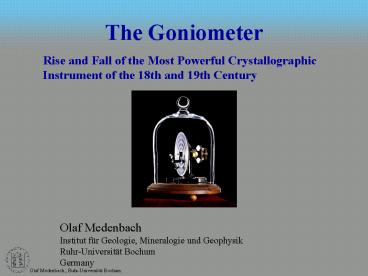The Goniometer - PowerPoint PPT Presentation
1 / 45
Title: The Goniometer
1
The Goniometer
Rise and Fall of the Most Powerful
Crystallographic Instrument of the 18th and 19th
Century
Olaf Medenbach Institut für Geologie, Mineralogie
und Geophysik Ruhr-Universität Bochum Germany
2
- Nicholas Steno
- (1636-1686)
- Danish scientist
- later pontifax of the Roman Catholic Church in
Italy - postulated the law of the constancy of
interfacial angles in 1669
Quartz, Germany
Quartz, Namibia
Quartz, Italy
3
- Jean-Baptiste L.
- Romé de l'Isle
- (1736 - 1790)
- French mineralogist
- compiled and described in 1772 all crystal forms
hitherto known - his student Arnould Carangeot invented the first
contact goniometer for exact measurements of
crystal angles, and thus made mineralogy a
quantitative science
4
Contact goniometer with detachable slotted
blades Stoe, Heidelberg, Germany, 1900
5
cubic
abc abg90
Fluorite Tennessee/USA
6
- René Just Haüy
- (1743 - 1822)
- Frech mineralogist
- postulated that crystals are composed by a close
stacking of parallelepipeds ("molécules
intégrantes", unit cells in modern parlance)
7
Traité de minéralogie, 1801
Garnet, Canada
8
- René Just Haüy
- (1743 - 1822)
- this explained that angles between crystal faces
are not arbitrary but can be derived from the
"molécule intégrante" by mathematic calculations - law of rational indices
9
- William Hyde
- Wollaston
- (1766 - 1828)
- British mineralogist
- invented the first optical reflecting goniometer
in 1809
10
Wollaston-type goniometer axis of rotation
oriented horizontally
11
Combinations of trapezohedron 211 and
dodecahedron 110
12
Wollaston goniometer with Degen's mirror
attachment French, unsigned, 1870
13
- Eilhard Mitscherlich
- (1794 - 1863)
- German analytical chemist and chrystallographer
14
Wollaston-Mitscherlich-type goniometer axis of
rotation oriented horizontally
- Mitscherlich applied optical telescopes with a
signal (e.g. crosshairs) for increased precision
15
Wollaston-Mitscherlich goniometer Meyerstein,
Göttingen, Germany, 1870
16
Isomorphism
- Apatite Ca5 (P O4)3?Cl
- Pyromorphite Pb5 (P O4)3?Cl
- Mimetite Pb5 (As O4)3?Cl
- Vanadinite Pb5 (V O4)3?Cl
17
Polymorphism
- Rutile TiO2 tetragonal P42
- Anatase TiO2 tetragonal amd
- Brookite TiO2 o'rhombic Pbca
18
Wollaston-Mitscherlich goniometer Jünger,
Copenhagen, Denmark, 1878
19
Malus-Babinet-type goniometer axis of rotation
oriented vertically
20
Malus-Babinet goniometer Breithaupt, Kassel,
Germany, 1872
21
- Quebec
- longitude 7112' W ?
- latitude 4649' N f
Two circle contact goniometer after
Goldschmidt Stoe, Heidelberg, Germany, 1900
22
Two circle "theodolite-goniometer" Fuess,
Berlin, Germany, 1900
23
Two circle "theodolite-goniometer" after
Goldschmidt Stoe, Heidelberg, Germany, 1900
24
- Victor Mordechai
- Goldschmidt
- (1853 - 1933)
- German crystallographer
- published the 9 volume Atlas der
Kristallformen, the most comprehensive work on
crystal morphology - designed the Goldschmidt two-circle goniometer
fabricated by Peter Stoe in Heidelberg
25
Gnomonic projection of the crystal forms of
calcite Goldschmidt, 1886
26
- Epoch-making discoveries made
- through goniometry
- Steno-de l'Isle law of the constancy of
interfacial angles - Crystal symmetry the seven crystal systems
- Hauy's law of rational indices
- Isomorphism and polymorphism by Mitscherlich
Concept of crystals as three-dimensional periodic
arrays of unit cells with a certain chemical
composition Crystal Structure
27
- Max von Laue
- (1879 - 1960)
- German physicist (Nobel Prize in 1914)
- showed in 1912 by one single genius experiment,
that - x-rays are an electromagnetic radiation
- crystals are composed of a three-dimensional
periodic array of atoms, the crystal lattice
28
Emerald, Columbia
29
Goniometers
- . They are irreplaceable witnesses to
cultural history and the history of the science
of mineralogy and crystallography. In these
specialized instruments the perfection of craft
of the precision machinist and optician was
combined with a large measure of esthetic
sensibility. - Burchard, 1998
30
(No Transcript)
31
Malus-Babinet goniometer Dubosque, Paris,
France, 1870
32
Contact goniometer, French, unsigned, 1830
33
Two circle "theodolite-goniometer" after
Goldschmidt Stoe, Heidelberg, Germany, 1900
34
Two circle "theodolite-goniometer" after
Goldschmidt Stoe, Heidelberg, Germany, 1900
35
Malus-Babinet goniometer Fuess, Berlin, Germany,
1880
36
(No Transcript)
37
(No Transcript)
38
tetragonal
ab?c abg90
Zirkon Russland
39
trigonal
a1a2a3 abg ? 90
Dioptas Namibia
40
hexagonal
a1a2a3 ab90, g120
Vanadinit, Marokko
41
rhombisch
a ? b ? c abg90
Topas Ural/Russland
42
monoklin
a ? b ? c ag90, b ?90
Gips Sizilien/Italien
43
triklin
a ? b ? c a ? b ? g ?90
Rhodonit, Australien
44
- NaCl - Steinsalz
- Die Elementarzelle hat eine Kantenlänge von
- 5,6 Å (0,00000000056 m)
- 4.000.000 Atome müssen aneinandergereiht werden
um 1 mm Kantenlänge zu produzieren
Steinsalz, Fulda
45
(No Transcript)

